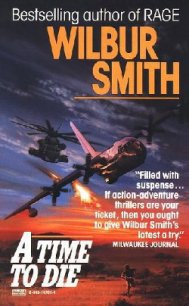Elephant Song - Smith Wilbur (читать книги онлайн бесплатно полностью без .TXT) 📗
Perhaps he was anticipating the day when he would promote himself, Daniel thought wryly.
Now Taffari used the baton to point out the features of the model on the table in front of him. As you can see, the mining track is a narrow pathway through the forest, only sixty yards wide. It is true that along that track we are felling all the trees and removing the undergrowth for the MOMU to follow. He paused seriously, and looked up at the camera. This is not wanton destruction but a prudent harvest, like that of a farmer husbanding his fields. Less than one percent of the forest is affected by this narrow strip of activity, and behind the MOMU comes a span of bulldozers to refill the mining trench and to compact and consolidate the soil. The trench itself is painstakingly following the land contours to avoid soil erosion.
As soon as the trench is refilled, a team of botanists follows up to replant the open ground with seeds and saplings. These plants have been carefully selected. Some of them are quickgrowing to act as a ground cover; others are slower growing, but in fifty years from now will be fully mature and ready to be harvested. I will not be there when this happens, but my grandchildren will. The way that this operation has been planned, we will never harvest more than one single percent of the forest each year. You don't have to be a mathematician to realise that it will be the year AD 2090 before we have worked it all, and by that time the trees that we plant now, in 1990, will be a hundred years old and we can safely begin the whole cycle over again.
He smiled reassuringly into the lens, handsome and debonair. A thousand years from now the forests of Ubomo will still be yielding up their largesse to generations yet unborn, and offering a haven for the same living creatures that they do now. It all made sense, Daniel decided. He had seen the proof of it in operation. That narrow track through the forest could not seriously threaten any species with extinction. Taffari was proposing exactly the same philosophy in which Daniel himself believed so implicitly, the philosophy of sustained yield, the disciplined and planned utilisation of the earth's resources, so that they were always renewing themselves.
For the moment, his animosity towards Ephrem Taffari was forgotten.
He felt like applauding him.
Instead he cleared his throat and said, Mr. President, that was an extraordinary performance. It was inspirational. Thank you, sir.
Sitting on the tailboard of the Landrover, Chetti Singh smoothed the document over his own thigh. He had developed a remarkable dexterity with his left hand.
This scrap of paper takes all the fun out of it, he remarked. It is not meant to be fun, Ning Cheng Gong said flatly. It is meant to be a present for my honourable father. It is meant to be work. Chetti Singh glanced up at him and smiled blandly and insincerely. He did not like the change that was so apparent since Ning had returned from Taipei.
There was a new force and strength in him now, a new confidence and determination.
For the first time Chetti Singh found that he was afraid of him.
He did not enjoy the sensation. Still, work goes better when it is fun, Chetti Singh argued to bolster himself, but found he could not meet Ning's dark implacable stare. He dropped his eyes to the document and read, PEOPLE's DEMOCRATIC REPUBLIC OF Ubomo Special Presidential Game Licence The bearer, Mr. Ning Cheng Gong, or his authorised agent, is hereby empowered by special presidential decree to hunt, trap or kill the following protected species of wild game anywhere in the Republic of Ubomo. To wit, five specimens of Elephant (Loxodonta Africana).
He is further empowered for reasons of scientific research to collect and have in his possession, to export or sell, any part of the aforesaid specimens including the skins, bones, meat and, or ivory tusks thereof.
Signed, Ephrem Taffari President of the Republic.
The licence was a rush job. There was no precedent for the form or wording of it and at Cheng's request the president had scribbled it out on a scrap of notepaper and the government printer had set it up under the coat of arms of the Republic of Ubomo, and delivered it within twelve hours for President Taffari to sign.
I am a poacher, Chetti Singh explained, the best in Africa.
This piece of paper turns me into a mere agent, an underling, a butcher's apprentice. . .
Cheng turned away impatiently. The Sikh was annoying him.
There were things other than this petty carping to occupy him.
He paced the forest clearing, lost in thought. The ground was muddy and rutted underfoot and the humidity steamed up the lenses of his sunglasses. He removed them and slipped them into the breast-pocket of his open-neck shirt. He glanced around him at the solid green wall of jungle that hemmed in the clearing. It was dark and menacing and he suppressed the sense of unease that it evoked and instead glanced at his wristwatch. He is late, he said sharply. When will he come?
Chetti Singh shrugged and folded the game licence with one hand. He does not have the same sense of time that we do. He is a pygmy. He will come when it suits him. Perhaps he is already here, watching us.
Perhaps he will come tomorrow or next week. I cannot waste any more time, Cheng snapped. There is other important work to do. More important than your honourable father's gift? Chetti Singh asked, and his smile was ironical. Damn these black people.
Cheng turned away again. They are so unreliable. They are monkeys, Chetti Singh agreed, but useful little monkeys. Cheng made another turn around the clearing, his feet squelching in the red mud, and then stopped in front of Chetti Singh again. What about Armstrong? he asked.
We have to deal with him. Ah, yes! Chetti Singh grinned. That will be fun, indeed. He massaged the stump of his missing arm. I have dreamed about Doctor Armstrong every night for nearly a year. And yet I never thought to have him delivered so neatly to Sengi-Sengi.
Like a trussed chicken, never mind. You will have to deal with him while he is still here, Cheng insisted. You can't allow him to leave here alive. Perish the thought, Chetti Singh agreed. I have been devoting much contemplation to the problem. I wish the good doctor's demise to be suitably symbolic and painful, and yet to be adequately explainable as a most unfortunate accident of fate. Don't wait too long, Cheng warned!
I have five more days, Chetti Singh pointed out complacently. I have seen the filming schedule. He cannot finish his work at Sengi-Sengi before that-Cheng cut in impatiently, What about the red-haired woman, his assistant? At the moment President Taffari is having some honking fun with her, but nevertheless I think it might be prudent to arrange for her to accompany Doctor Armstrong on the long journey- Chetti Singh broke off abruptly and stood up. He peered into the forest and when Cheng opened his mouth to speak he silenced him with an imperative gesture. For another minute he stood listening with his head cocked before he spoke again. I think he is here. How do you know?
Despite himself Cheng's voice was a cautious whisper and he cleared his throat nervously as he peered into the jungle. Listen, said Chetti Singh. The birds. I hear nothing. Precisely. Chetti Singh nodded.
They have fallen silent.
He stepped towards the green wall and raised his voice, calling in Swahili. Peace be with you, son of the forest. Come forward, so that we may greet each other as friends. The pygmy appeared like a trick of the light in a hole in the wall of vegetation. He was framed in a wreath of shining green leaves, and a ray of sunshine through the top branches that surrounded the clearing danced upon his glossy skin and threw each muscle of his powerful little body into high relief. His head was small and neat. His nose was broad and flat and he wore a goatee beard of soft curling black wool, laced with silvery grey. I see you, Pirri, the great hunter, Chetti Singh greeted him with flattery and the little man came into the clearing with a lithe and graceful step. Did you bring tobacco?




